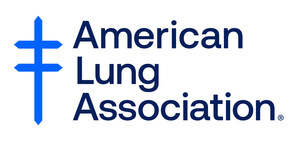
CHICAGO, Oct. 28, 2025 /PRNewswire/ -- Today, the American Lung Association released a new report, "Getting Health on Track: Cleaner Locomotives for Healthy Air." The report highlights the significant health risks posed by outdated diesel locomotives travelling across America and calls for urgent federal action to modernize standards. While cars and trucks often receive the spotlight for air pollution, trains remain a major source of nitrogen oxides and diesel particulate matter, which contribute to lung disease, heart disease, cancer and premature death. They also emit greenhouse gases, exacerbating the health challenges amplified by climate change.
The report shows that most U.S. passenger and freight trains still operate on diesel engines built decades ago. There are federal regulations in place to limit emissions from newer trains, most recently the "Tier 4" emissions standards set in 2008 by the U.S. Environmental Protection Agency (EPA). However, regulatory loopholes allow the oldest, dirtiest engines to remain in service for decades without reducing emissions. These engines emit pollutants that:
- Worsen asthma and chronic lung disease
- Increase cardiovascular risks, including heart attacks and strokes
- Contribute to lung cancer and other respiratory illnesses
- Disproportionately affect children, older adults, pregnant individuals, and people with pre-existing conditions
"Trains are a serious source of toxic pollution, especially for rail workers and communities near railyards, ports and major transit hubs," said Harold Wimmer, President and CEO of the American Lung Association. "Modernizing locomotive standards isn't just about cleaner air—it's about saving lives, reducing cancer risk and ensuring that communities and workers are not left behind. The technology exists today to eliminate these emissions, but outdated regulations and decades-old engines continue to put people's health at risk. Federal action is needed now to deliver cleaner air for everyone."
Rail yard workers face particularly high exposure to these pollutants and their health impacts. Diesel exhaust is a known human carcinogen, and long-term exposure is linked to chronic respiratory illness, lung cancer and heart disease. Workers in rail yards have reported persistent coughing, shortness of breath, headaches and higher rates of asthma among themselves and family members.
The report also emphasizes how locomotive pollution impacts some communities more. Communities near railyards, ports, and transit hubs bear the heaviest burden of exposure. In cities such as Chicago, Houston, and Los Angeles, diesel emissions from freight and passenger trains are a constant risk to their health.
Fortunately, the report identifies available solutions that can drastically reduce pollution and protect public health, including:
- Battery-electric locomotives
- Overhead wires used to power electric trains
- Transmission colocation alongside existing power infrastructure
The report urges EPA to:
- Close regulatory loopholes that allow outdated locomotives to remain in service indefinitely
- Establish a new Tier 5 standard that reflects new technologies
- Require phase-out or modernization of the oldest, dirtiest engines
The full report, "Getting Health on Track: Cleaner Locomotives for Healthy Air", is available at Lung.org/locomotives.
29 national, state and local health and medical organizations, and 597 individual signers also urge the EPA to modernize locomotive emissions standards.
About the American Lung Association
The American Lung Association is the leading organization working to save lives by improving lung health and preventing lung disease through education, advocacy and research. The work of the American Lung Association is focused on four strategic imperatives: to defeat lung cancer; to champion clean air for all; to improve the quality of life for those with lung disease and their families; and to create a tobacco-free future. For more information about the American Lung Association, which has a 4-star rating from Charity Navigator and is a Platinum-Level GuideStar Member, call 1-800-LUNGUSA (1-800-586-4872) or visit: Lung.org. To support the work of the American Lung Association, find a local event at Lung.org/events.
American Lung Association • 55 W. Wacker Drive, Suite 1150 • Chicago, IL 60601
1331 Pennsylvania Ave. NW, Ste. 1425 North • Washington, D.C. 20004
1-800-LUNGUSA (1-800-586-4872) Lung.org
CONTACT: Jill Dale | American Lung Association
P: 312-940-7001 E: [email protected]
SOURCE American Lung Association







Share this article